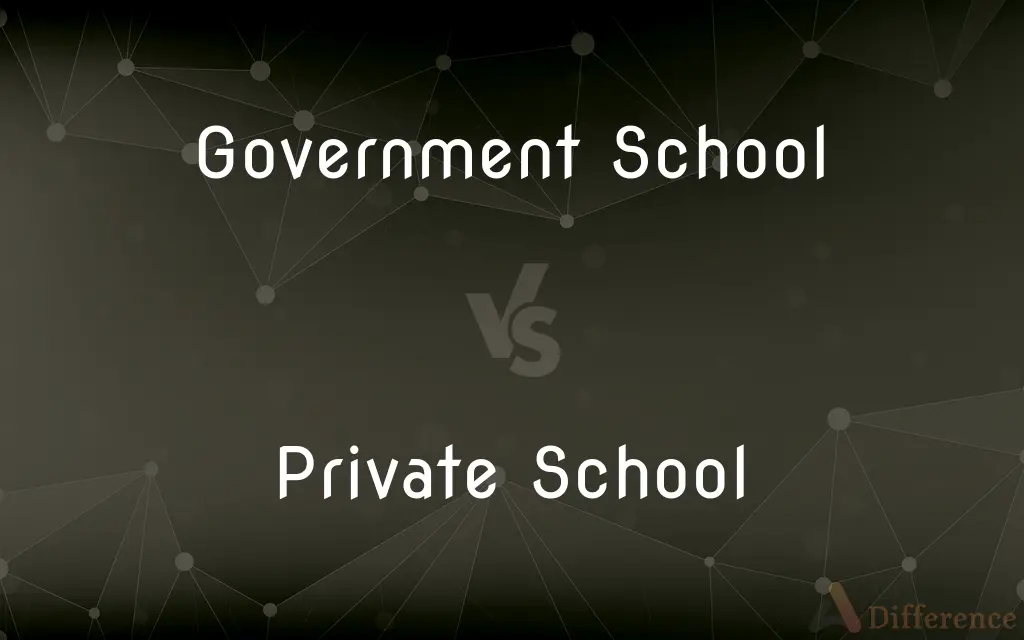Government School vs. Private School — What's the Difference?
Edited by Tayyaba Rehman — By Fiza Rafique — Published on December 3, 2023
Government Schools are funded and operated by public agencies, while Private Schools are funded through tuition, donations, or private sources and are managed privately.

Difference Between Government School and Private School
Table of Contents
ADVERTISEMENT
Key Differences
Government School is a learning institution that's funded, controlled, and maintained by public agencies, typically state or local educational departments. Private School, on the other hand, operates independently from government control, relying mostly on student tuition fees, private donations, or religious organizations for funding.
While Government School is subject to state curriculum and standard regulations, ensuring a unified education system, Private School has the flexibility to design its curriculum, which can be based on various educational philosophies or religious teachings.
Tuition for a Government School is often free or at a minimal cost for residents of a district or state, as it's supported by taxpayer money. In contrast, Private School usually charges tuition, which can vary widely based on the school's reputation, location, and amenities.
The admission process for a Government School typically relies on zoning or residency requirements. In contrast, a Private School can have selective admission criteria, including academic performance, interviews, or entrance exams.
Both Government School and Private School aim to provide quality education. However, resources in Government Schools might be stretched thin due to large student populations, while Private Schools may offer more personalized attention with smaller class sizes.
ADVERTISEMENT
Comparison Chart
Funding Source
Funded by taxpayer money
Funded by tuition fees, donations, private sources
Control
Managed by public agencies
Operated privately
Tuition Fees
Usually free or minimal
Can range widely
Admission Criteria
Based on residency or zoning
May include academic criteria, interviews, etc.
Curriculum Flexibility
Often follows state standards
Can have its own curriculum design
Compare with Definitions
Government School
Schools operated under state or local educational agencies.
The curriculum in the Government School is set by the state education department.
Private School
Schools that operate without direct control from public agencies.
The Private School can decide on its own extracurricular activities without state interference.
Government School
Schools that aim to provide education to all, irrespective of income.
The primary goal of the Government School is to ensure every child has access to education.
Private School
An independent educational institution not funded by public sources.
Karen goes to a prestigious Private School, which has its own unique curriculum.
Government School
An educational institution funded by public sources.
John attends a Government School in his local district, which offers free education.
Private School
Schools that might be affiliated with religious or other organizations.
The Private School in town is run by a religious organization and includes religious studies in its curriculum.
Government School
Institutions often following a uniform curriculum set by the state.
Every Government School in the state teaches the same history course.
Private School
Institutions with selective admission policies.
The Private School only admits students who pass its rigorous entrance exam.
Government School
Schools where education is often subsidized for residents.
Attending a Government School means parents don't have to worry about high tuition fees.
Private School
Institutions often charging tuition for enrollment.
Parents chose the Private School for its advanced programs, even though there's a tuition fee.
Common Curiosities
Can anyone attend a Private School?
Admission to Private Schools can be selective, based on academic criteria, interviews, or other factors.
How is a Private School different from a Government School?
A Private School operates independently from government control and is primarily funded by tuition fees, donations, or private sources.
What is a Government School?
A Government School is an educational institution funded and operated by public agencies.
Are Government Schools and Private Schools equally good?
Both can offer quality education, but experiences can vary based on resources, class sizes, curriculum, and other factors.
Do Private Schools receive any public funding?
Typically, Private Schools rely on non-public sources, though some might receive funds for specific programs.
Do Government Schools charge tuition?
Government Schools are often free or charge minimal fees for local residents, funded by taxpayers.
Do Government Schools have extracurricular activities?
Yes, many Government Schools offer a variety of extracurricular activities, similar to Private Schools.
Is the curriculum the same in both types of schools?
Government Schools follow state standards, while Private Schools have curriculum flexibility.
Are all Private Schools religious?
No, while many Private Schools have religious affiliations, many are secular.
Why do some parents choose Private Schools?
Some choose Private Schools for smaller class sizes, specific curricula, religious teachings, or reputation.
Are Private Schools always more expensive?
While many Private Schools charge tuition, fees vary, and some might offer scholarships or financial aid.
Are teachers in Private Schools required to have certification?
While many Private Schools prefer certified teachers, requirements can vary by school.
Why are some Government Schools overcrowded?
High demand and limited resources can lead to overcrowding in some Government Schools.
Can Private Schools cater to specific learning needs?
Many Private Schools offer specialized programs or cater to specific learning styles or needs.
How are Government Schools funded?
Government Schools are primarily funded by taxpayer money through local or state agencies.
Share Your Discovery

Previous Comparison
Osmosis vs. Dialysis
Next Comparison
Gravitational Potential Energy vs. Elastic Potential EnergyAuthor Spotlight
Written by
Fiza RafiqueFiza Rafique is a skilled content writer at AskDifference.com, where she meticulously refines and enhances written pieces. Drawing from her vast editorial expertise, Fiza ensures clarity, accuracy, and precision in every article. Passionate about language, she continually seeks to elevate the quality of content for readers worldwide.
Edited by
Tayyaba RehmanTayyaba Rehman is a distinguished writer, currently serving as a primary contributor to askdifference.com. As a researcher in semantics and etymology, Tayyaba's passion for the complexity of languages and their distinctions has found a perfect home on the platform. Tayyaba delves into the intricacies of language, distinguishing between commonly confused words and phrases, thereby providing clarity for readers worldwide.
















































